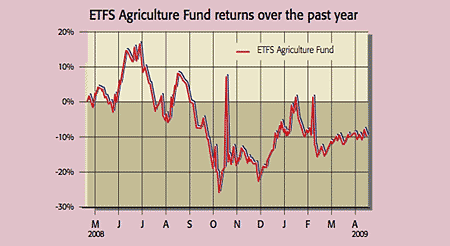
Unsurprisingly, fears over swine flu have hit shares in travel agents and boosted drug majors. Less widely noted has been the impact on soft commodity prices. Hog prices fell 4%, while soybeans and corn fell 4.1% and 5.7% respectively, on fears of a drop in demand for pork and livestock feed. But swine flu is just the latest worry for the agricultural commodities market – prices for softs have been falling for over a year.
Soybeans are down 26%, while lean hogs have fallen 34%. Global demand is weak, while production costs such as fuel prices and freight charges have dived as global trade has plunged. Investors have been pulling money out of any assets perceived as risky. The Schroders Agriculture Fund, for example, has fallen in size from $6.4bn in February 2008 to $1.5bn today.
However, the main drivers of the soft-commodity super-cycle remain intact, Richard Warburton, head of agribusiness consultancy Bidwells, tells the FT. The world’s population is increasing, diets are changing as people become wealthier and the growth in biofuels, which diverts foodstuffs to fuel, is continuing. By 2020, there will be fewer than 0.2 hectares of land per person for animal and crop production, says the UN Food and Agriculture Organisation. In 1970, it was almost 0.4.
This is a dangerous trend, considering yields are falling, says the International Rice Research Institute. At the same time as having less land per person, the land is also becoming less productive. What’s more, “the huge amounts of money being pumped into the global economy may in time prove to be strongly reflationary”, says Rob Pemberton of HFM Colombus. Softs could be “a sensible hedge against a possible surge in commodity demand or an inflation scare in the next couple of years”.
Now may be a good time to buy. The ‘swine flu’ drop in prices is an “over-reaction of the very first order”, says Dennis Gartman of The Gartman Letter. He suggests selling gold and buying grain to profit. We wouldn’t be keen to dump gold, but feeding some money into softs looks a good idea for the more adventurous. Tim Price of PFP Wealth Management likes the exchange-traded commodity basket ETFS Agriculture (LSE:AGAP). It tracks the Dow Jones Agriculture Index (down 11.4% on the year) and covers softs including cotton, soybeans and wheat. The annual management fee is 0.49%.